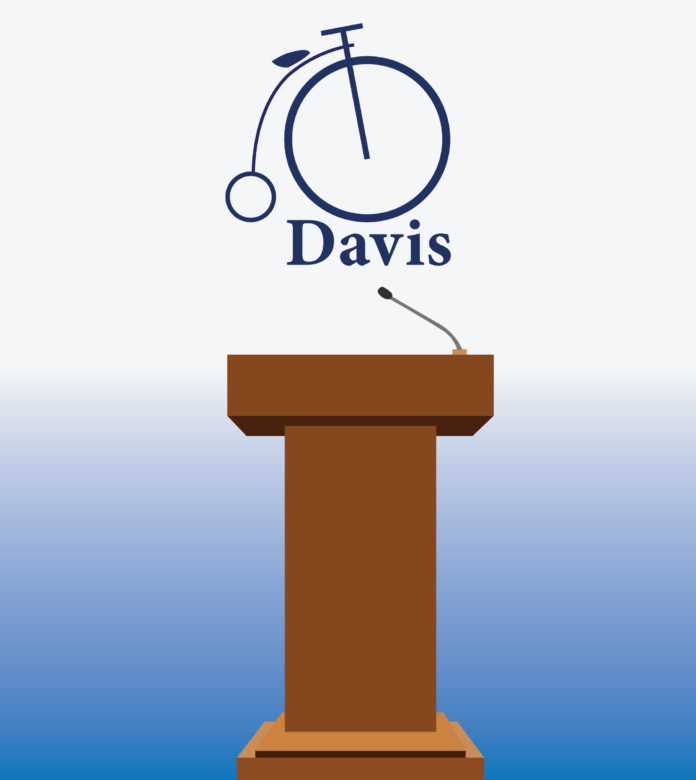Mayor Will Arnold and City Manager Michael Webb joined the chamber to discuss housing, infrastructure and more
By MADELEINE YOUNG AND ALEX UPTON — city@theaggie.org
On March 1, Mayor Will Arnold and City Manager Michael Webb presented the annual State of the City address with the Davis Chamber of Commerce. The panel discussed pressing issues in Davis such as financial outlook, infrastructure investments, development updates, social services and the housing crisis.
Executive Director Cory Kohler said that while the chamber is financially stable and healthy, membership has declined due to the pandemic. The chamber contributes substantially to Davis’s economic position, dating back to when it lobbied for UC Berkeley’s farm (now UC Davis) to be placed in Davis.
Mayor Will Arnold began the address by discussing a key concern for Davis residents: housing insecurity. According to Arnold, the city approved an unprecedented number of new housing projects to address student and workforce housing needs, as well as implementing several larger projects. He specifically mentioned Paul’s Place, a vertical home village that opened recently.
“Certainly there’s more to be done,” Arnold said. “We need to redouble our efforts on seeking supportable and sustainable housing, particularly for folks who are a part of our workforce, folks who qualify for low-income housing and for young families.”
Arnold made a point to recognize the relationship between Davis public schools and the well-being of the city. He spoke about the schools’ steady decline in enrollment and why it is important to address the housing crisis in a way that ensures families with young children will be able to afford housing in Davis.
“As goes our school districts, so goes our property values in Davis,” Arnold said. “I’m a firm believer in that. It’s easy to say there’s a big difference between the work that the school does and the work that the city does, but in this case, there’s a real symbiotic relationship here between the quality of community assets that we’re able to provide and the quality of schools we have.”
During the address, multiple charts were presented detailing the city’s general funds and sources reported in this fiscal year as well as revenue trends. The lack of affordable housing, senior housing and student housing amounted to 29% of the key issues the city is focusing on. The data presented also revealed that other pressing issues were homelessness, crime, safety and development.
“The city really is looking at the full spectrum of housing needs in our community, whether it’s student housing, housing for folks who work in town, housing for folks who are coming off of the streets,” Arnold said. “These are all critical needs and all things that you have a council that recognizes the importance of that need and is continuing to do the work even in the face of community opposition when it happens to add housing.”
City Manager Michael Webb concluded the address by discussing the condition of the city and reviewing city research. He said that, overall, residents appear satisfied and optimistic. Affordable housing is the predominant issue in Davis, followed by homelessness and public safety. While the city budget is dependent on property tax for revenue, cannabis taxes are quickly becoming a strong revenue source.
The city is investing in improving pavement conditions and expects to focus on repairing downtown and other busy streets in the coming year, according to Webb. Webb emphasized the importance of investing in these kinds of repairs before the damage gets too drastic. Specific focus was placed on roads and pavements, as currently, Davis pavements are rated between fair and poor. The address noted that without further action by 2029, 25.5% of streets and 26.1% of bike paths will be considered in “failed” condition.
“It’s crucial that we make every effort to stay on top of our road conditions and not let them get to a point of failure because at that point, they are exponentially more expensive to repair,” Webb said. “I want to applaud the City Council for making substantial improvements in terms of our investment locally in general fund dollars, seeking grants, using some of our gas tax money and putting that directly towards roads to the tune of about 9 million dollars a year. That is a huge improvement over what investments were made prior to that.”
Written by: Madeleine Young and Alex Upton











